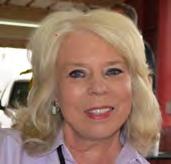
3 minute read
That Old-Timer Music Offers a Happy Place
By Emma Boyce
When Jean Ann Feneis sits down at the piano, she’s transported.
Advertisement
No, she’ll tell you, she’s not the best. In fact, at 71, she’s still learning. But having discovered the instrument late in life, the reward of playing eclipses any self-doubt. For the last five years, Feneis has been taking lessons with Eberle Damron at the Community Music School of the Piedmont. She’s one of several older adults turning to the school to pursue a passion that had otherwise been placed on hold.
“I love to sit in my piano room and practice,” said Feneis. “I have a happy life, but when I play I feel like it’s a new happy place to go to.”
Feneis, like many her age, has the luxury of time. The constraints of work and family have abated. Resources have expanded. But just because more time allows for other pursuits doesn’t mean they come easy. Science reminds us that children are musical sponges, picking up notes as easily as naughty words. Adults, on the other hand, must work harder.
“Children who have parents that make them practice are much better,” she said, recalling the time her husband teased her about a five-year-old outplaying her. “I had nobody hanging over my shoulder, except Eberle.”
Still, Feneis’ mindset has also changed. The idea of being the best no longer really matters, and in that sense, Feneis might be more advanced than her younger counterparts. Feneis plays piano because she loves the sound. She plays because, as a child, she longed for lessons, and now, as an adult, she refuses to move into a house that won’t also fit her baby grand piano.
Chris Patusky, 56, already had a background in trumpet when he sought out lessons for the jazz piano at the Community Music School. He thought a jazz pianist teacher would be hard to come by in Upperville, but the school surprised him. Martha Cotter, the school’s director, had recently hired one out of Shenandoah University.
“Randy Martono-Chai is a tremendous player,” said Patusky of his young teacher. “He’s so far above me in the knowledge of jazz, so it was great to have an authority regardless of his age.”
Patusky’s return to music coincided with a point in his life when he could both afford lessons and make time for them.
“After I did other things with my career, I came back to music,” he said. “I have a passion for it. It’s a release, a diversion into a different place mentally, spiritually, and emotionally. It feels great to go there.” Despite the advantage of knowing how to read music, the piano might as well have been a foreign language for Patusky.
“It’s a difficult thing to pick up,” he said. “Two hands, a bass clef and treble clef. The piano takes a lot of hours of practice, but it’s easier, too, because I don’t really care how I do. I don’t have instructors who are demanding a certain performance from me and I’m old enough constitutionally in my mind and in my personality to not care so much.”

Piedmont Music student Jean Ann Feneis

Piedmont Music teacher Miho Sato de Saucedo
Miho Sato de Saucedo, who has been teaching classical piano at the school since 2004, experiences the struggles of adults learning music firsthand. Her students range from young children to seniors. She knows that returning to music as an older adult or even picking it up for the first time takes some courage.
“It’s hard to go back and face it,” said Sato. “Students find it’s not as easy as it used to be. The ones that stay with it are really motivated. They find meaning or purpose in it. That’s why it’s so rewarding to work with them.”
Sato’s older students encounter just as many physical barriers as mental ones. Stiff hands. Bad backs. In those cases, Soto begins the day with exercises like wiggling fingers until circulation improves. One woman in her 70s didn’t believe improvement was possible until, after three weeks of exercises, she noticed better feeling in her fingertips.
“Music improves their body parts and their movements,” said Sato, also a board-certified music therapist. “But the brain is key…Almost everywhere in the brain is activated by making music. Movement, memories, emotions.”
Sato used to teach women in their 30s and 40s, but many quit. Their families came first. Work schedules got in the way. Music, at that point, was expendable, but when, in life, a space does opens for art, Chris Patusky said it best.
“It feels great to go there.”







